Scotland: What must Gordon Strachan learn from friendlies?
- Published
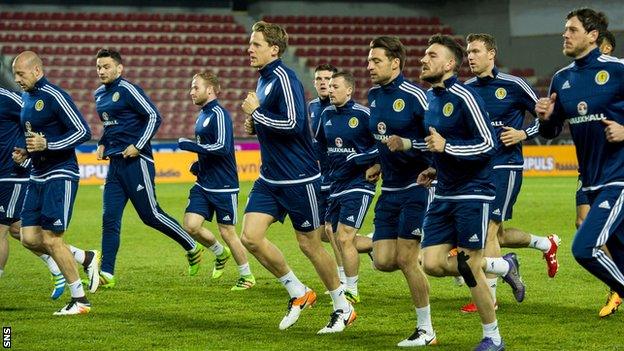
The Scotland squad train in Prague ahead of their friendly match on Thursday
Czech Republic v Scotland |
|---|
Venue: Generali Arena, Prague Date: Thursday 24 March Kick-off: 19:45 |
Coverage: Listen on BBC Radio Scotland 810MW/DAB/online; live text commentary on BBC Sport website |
In some respects, Gordon Strachan has already delivered his judgement call.
He has spoken about the reduced pool of talent he has to choose from, how other countries have stronger, taller athletes and growing populations of second and third-generation African immigrants that have bolstered their games.
The two squads he chose for the two friendly matches in this international break - containing at the outset nine uncapped players across the two 19-man selections - tell of the fine balance that has to be struck between experimentation and relying on a trusted group.
The reaction has been varied, not least because supporters will always have a favoured player to champion, and some of the omissions, like Jordan Rhodes, Graeme Shinnie and, before he was called up as an injury replacement, Ross McCormack, have been performing impressively and consistently for their club sides.
So what does the Scotland manager need to learn from the two matches, away to the Czech Republic and at home to Denmark?
Scotland media conference in Prague: Gordon Strachan and Darren Fletcher
Can the debutants break through?
This is the critical question. Strachan has established a core of players, and built a club mentality where they have developed relationships and trust with each other.
That spirit is a vital commodity when teamwork and unity are so valuable to the side. As Strachan has pointed out, Scotland do not have an equivalent of Robert Lewandowski, Zlatan Ibrahimovic or Luka Modric to individually raise the quality of the team.
Even so, freshness is required after a period of time. There is worth in relying on a group of players, but they need to be assisted, and in some cases driven on, by newcomers to the squad.

Nottingham Forest midfielder Oliver Burke is in the Scotland squad to play Denmark at Hampden, just ahead of his 19th birthday
Of the potential debutants, John McGinn and Kieran Tierney would seem well-placed to make an impact. Others, like Liam Cooper and Oliver Burke would be welcome additions if they can meet the standard, since Scotland needs more options in their respective positions. A figure like Tony Watt, who has plenty of talent but has yet to show the application to fulfil his potential, will be an intriguing contributor.
In short, though, Strachan needs some of these players to make the same impact as Andrew Robertson, who played his way into the starting line-up almost as soon as he was called up.
Is there life left in some of the tried and trusted players?
Some players will be mainstays of the World Cup qualifying campaign. It is unlikely, for instance, that David Marshall, Craig Gordon and Allan McGregor will be overtaken as the leading goalkeepers.
It is in defence, most pressingly at centre-back, where the sense remains that some figures might have played out their time. Gordon Greer has not featured for Brighton since January 12, and he is 35, yet Strachan insists that no other defender is challenging him for the right centre-back position.
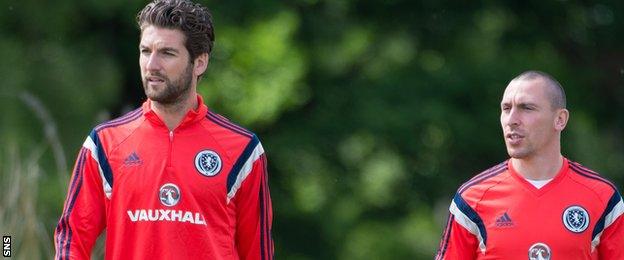
How long will Strachan go with the Celtic duo Charlie Mulgrew and Scott Brown?
The likes of John Souttar and Jordan McGhee might feel that they can step up in time, but for now the wonder is how many of the old guard can remain relevant. Steven Whittaker has dropped out of the squad because his wife his due to give birth, but he has fallen out of favour at Norwich.
In midfield, the partnership between Scott Brown and Charlie Mulgrew was dynamic and strong at international level, with the latter playing some of his best football during the Euro 2016 qualifying campaign, but will that chemistry remain?
Both are in the squad for the Denmark game, although Mulgrew has been listed as a centre-back, and Strachan may feel that once the competitive games come around, James McArthur will have recovered from injury and restored the form that saw him play so vibrantly for Crystal Palace in the English top-flight.
There is, too, the gradual shift in Darren Fletcher's role, from captain and mainstay to squad member. He continues to perform at a high level for West Bromwich Albion, but has not always been a first choice for Strachan, even if the manager continually lauds his professionalism and presence in the squad. Fletcher might feel that he has a point to prove, or that it might be futile.
Where will the goals come from?
There is a perennial question when it comes to Scotland's striking options. Strachan has favoured a sole-striker system, and so consistently chosen the best player to fill that role - Steven Fletcher. His contribution cannot be measured in goals alone, since the position demands other attributes.
An appreciation of the role is no defence when other contenders for the position are scoring regularly. Leigh Griffiths' haul for Celtic makes him a clear candidate to play up front for Scotland, and Celtic line up with a sole centre-forward also. Griffiths' game is based on different attributes, but there will be times in the next campaign when the system needs to have variety.
That is where the exclusion of Rhodes becomes a valid talking point. If he does not fit the lone-striker system, that does not mean that he cannot contribute in certain games or under certain circumstances, such as when Scotland are chasing a goal. Few countries will, after all, entirely ignore a prolific striker.
Going into the World Cup qualifying campaign, Strachan needs to find the balance between turning again to his trusted core of players and freshening up the team with new players. For all the clamour to experiment, it might also be remembered that Berti Vogts held a series of casting sessions as he called up a host of players, and was criticised for that approach.
Strachan will follow his instincts. These two friendlies will confirm or challenge many of his opinions. It is up to the players, though, to make the positive impression.
- Published23 March 2016
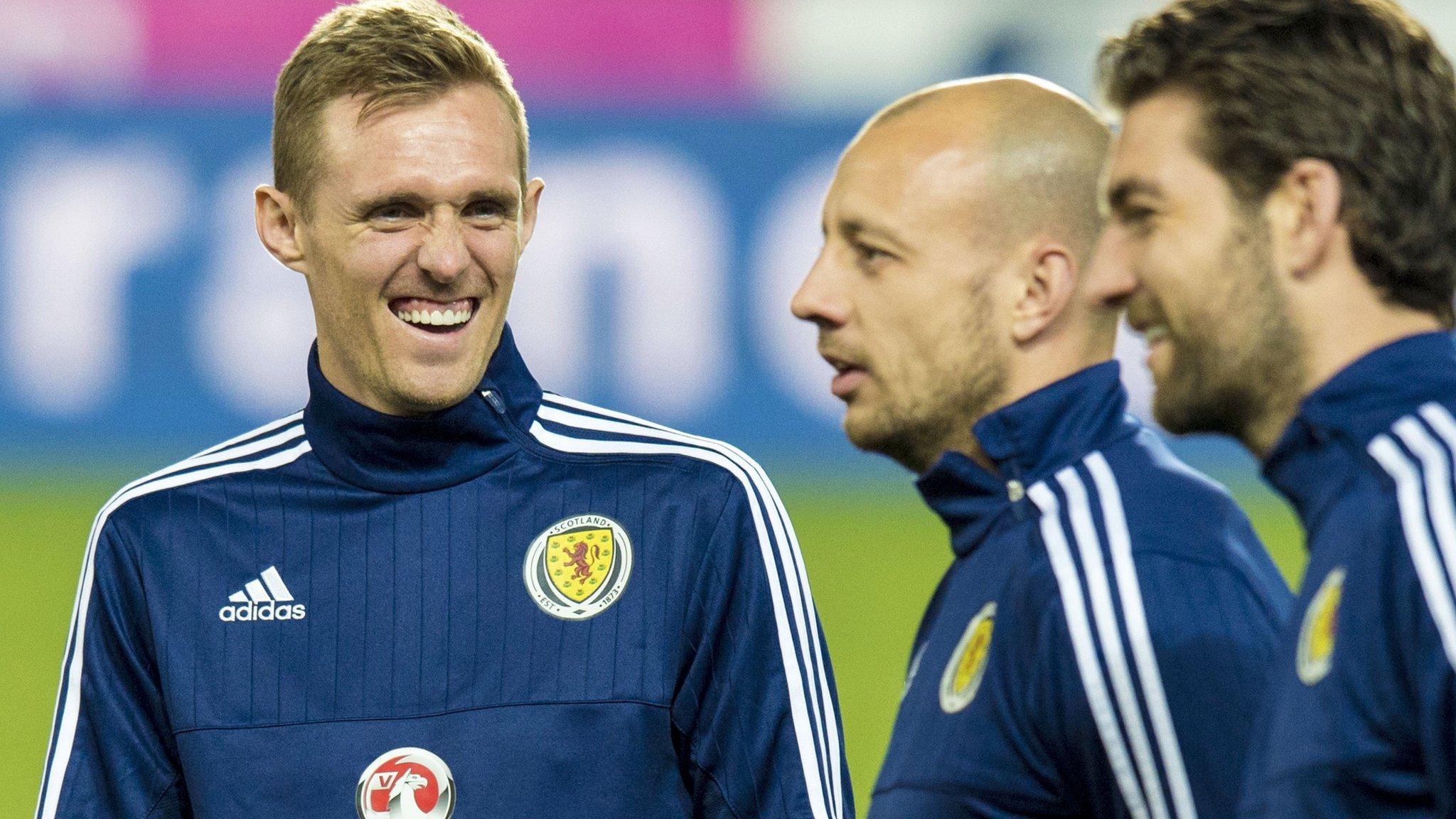
- Published24 March 2016
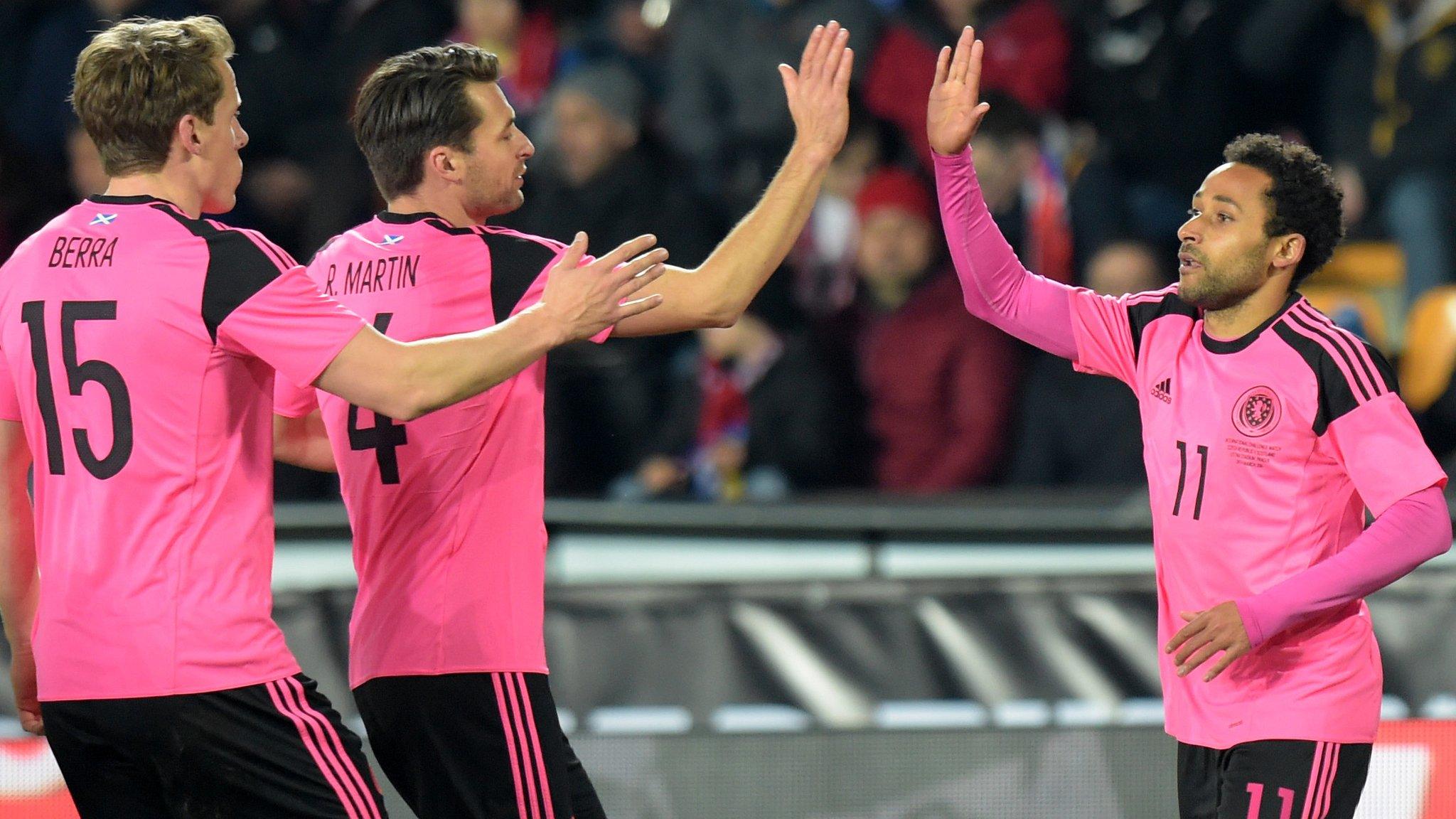
- Published23 March 2016
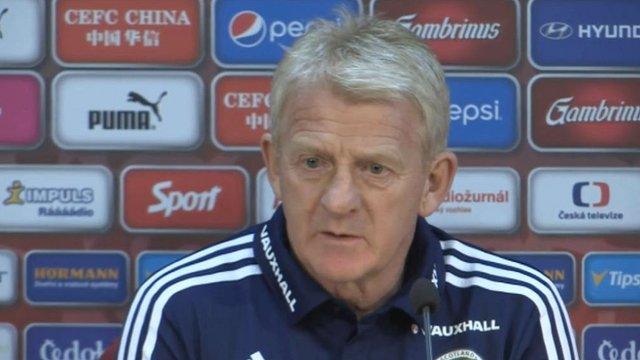
- Published7 June 2019

- Published20 June 2016
